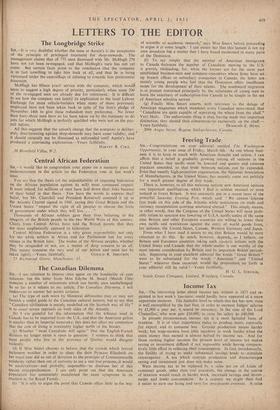Freeing Trade
Sta,r—Congratulations on your editorial entitled The Washington Opportunity, in your issue of Friday. March 6th. As one•whose busi- ness it is, to keep in touch with American thought and action,' I can affirm that a belief is gradually growing among all sections in the United States that tariffs must be lowered and quotas and customs practices amended, so that trade between nations can be expanded. Even thatusually high-protection organisation. the National Association of Manufacturers, in the United States. has recently conic out publicly for a much greater degree of, free trade.
There is, however, to all this welcome carrent.new American opinion one important qualification, which 1 find is seldom stressed or even noticed in Great Britain. It was succinctly put in a recent issue of the powerful Saturday Evening Post. which said: " We cannot' tolerate free trade on this side of the Atlantic while .restrictions on trade and currency manipulation continue unabated abroad." This simply means, in other words, that the Congress of the United States will most prob- ably refuse to sanction any lowering of U.S.A. tariffs'unless at' the same time Britain and other European countries are willing to lower their own tariffs and restrictions against the entry of world goods from, for instance, the United States, Canada, Western Germany and Japan.'
From what I have read it seems to me that Britain would be most reluctant to do this. So much, however, depends, so I believe, on Britain and European countries taking such vis-r)Tris actions with the United States and Canada that the whole-matter is one worthy of the most intense consideration by Britain and by important British periodi- cals. Supposing in your excellent editorial the words " Great Britain " were to be substituted for the words " American " and " United States" wherever these occurred, would the propositioR set forth in your editorial still be valid 7.-Yours faithfully,


































 Previous page
Previous page